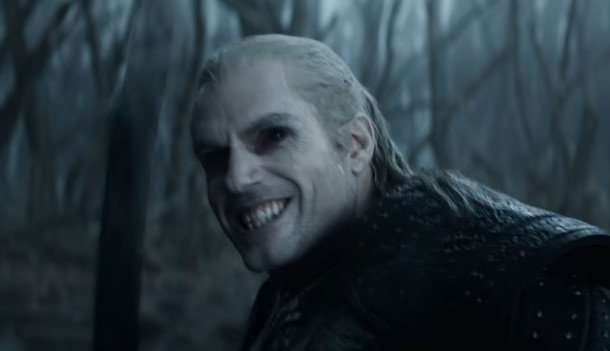The Witcher videogames are fantasy RPGs, based on fantasy novels and short stories written by Andrzej Sapkowski. But The Witcher series on Netflix "leans more towards horror," visual effects supervisor Julian Parry told SFX magazine (via GamesRadar), because the world of The Witcher is actually pretty horrific—and also because it's easier to manage.
"I definitely think it leans more towards horror. We’re definitely taking the fantasy out. I can honestly say we’re not fantastical. I mean, it’s fantastical but in a grounded horror sense," Parry said. "For example, with Striga [a woman cursed to live as a monster], that’s one gnarly-looking thing. That’s very unpleasant!"
Courtesy of The Witcher Wiki, this is what a Striga looks like, and it's fair to say that she wouldn't be out of place in your average D-list slasher flick:
Logistics are a factor, too. "We’ve got the Nilfgaard armies, which can’t exist because there are 10,000-plus of them," Parry said. "Same with the Temerians and the Cintrans. the armies physically can’t exist here on set."
Anyone who's watched Game of Thrones can tell you that CGI goes a long way toward filling that hole, and it's not as though huge armies won't make any sort of appearance in the series—we catch a brief glimpse of a large-scale clash between armies in The Witcher trailer, after all. But The Witcher is a very personal story—when you get right down to it, Geralt is just a guy trying to make a living in a gig economy—and that's where elements of horror can really shine, even in a clearly fantastical setting.
I'm eager to see how it works out, but "taking the fantasy out" notwithstanding, I'm reasonably confident that The Witcher on Netflix will still be a fantasy tale: A Striga may be horrifying, but it's going to take a sword and some magic to deal with it, after all.
The Witcher will debut on Netflix on December 20. A second season hasn't been signed yet, but showrunner Lauren Hissrich is ready for it: She recently said that she's already got seven seasons mapped out.

PanOfCakes on November 6th, 2019 at 16:11 UTC »
The Witcher world is a dark, terrifying place. It should be portrayed as such. Even toussaint, a bright happy looking place, in the middle of the dark, damp, bitter horror that is the rest of the world is filled with giant carnivorous plants, vampires, drowners, and huge worms.
jedifan421 on November 6th, 2019 at 15:27 UTC »
Anyone that has read the books and played the games knows how horrific a lot of the storytelling in The Witcher universe can be (the entire "Bloody Barron" storyline and the sidequest involving haunting spirits in a tower on an abandoned island in Witcher 3 are the most notable recent examples) plus it is a world full of dangerous monsters. I'm sincerely glad they are leaning full tilt into more of a grounded horror-fantasy than stripping away those horror elements. That has me more confident the show will capture the spirit of the books than ever.
jononarf on November 6th, 2019 at 15:06 UTC »
Read this article elsewhere, but as it should. Necrophages, cursed ones, and what humans do to each other for power in this universe should be terrifying since this is based on the books. I'm hoping that if they do some short-story inspired episodes, they don't hold back there either.
Here's hoping the first season of the Witcher is good enough that it stands out from what everybody (aka articles) keeps declaring it as "just Netflix's GoT." If the focus does go more towards Geralt's contracts, for some episodes, I'm all for it honestly. The Witcher TV series could be perfect for some stand alone "monster of the week" episodes.